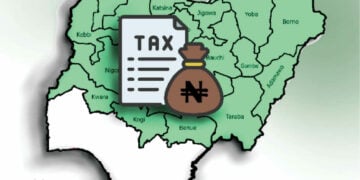Don’t give up on the rural areas as Nigeria’s food basket yet. Help is on the way. That is the message of the recent launch of the Special Agro-Processing Zone initiative led by the African Development Bank, AfDB.
For too long, we have come to accept the notion of rural areas being centres of poverty where the notion of ‘agriculture’ is coterminous with subsistence farming. That is about to change if we follow through with the good fortune that has literally fallen into our laps, courtesy of the $520 million Special Agro-Industrial Processing Zones (SAPZs) Program recently launched in Abuja. The Program is designed to support inclusive and sustainable agro-industrial development in Nigeria.
Saying that Nigeria has huge agricultural development potentials has virtually become a cliche. A helicopter flight over our vast lands shows that nature has been very generous to this land of 200 million souls. However, Nigeria’s agricultural sector is retarded by low crop yields and about 30%-50% post-harvest losses. The Covid scourge and perennial insecurity have made matters even worse. There is little or no value addition amid inadequate energy and poor transportation infrastructure.
The Global Hunger Index (2022) ranks Nigeria 103rd among 121 countries facing hunger crises in the world. That explains the urgency in the voice of the AfDB President, Dr. Akinwumi Adesina when he called for “greater action, responsiveness, and delivery to avert a food crisis in Nigeria”. He admonishes the government to “decisively tackle insecurity challenges that prevent farmers from going to the farms” because “Food security needs national security”.
There isn’t much to excite the private sector to invest in the sector and kickstart agro-industrialisation. The result is that locally produced food is not competitive and the country spends so much foreign exchange to import food while the food producers of our rural areas are sentenced to a miserable life of indigence. If we get the equation right, as the AfDB-led initiative is intended to do, the private sector will be encouraged to invest in agro-industry thereby helping to reduce the high unemployment rate which currently stands at 33.3 percent or 22.2 million people.
Stripped of technicalities and official jargons, the program is designed to transform rural areas to industrial centres with all modern infrastructure through the instrumentality of agriculture as a sustainable business as against subsistence farming.
The program reminds this writer of the “Sogbedigboro” (“transforming the bush into cities”) rural transformation program of the old Western Region of Nigeria which was responsible for turning many erstwhile rural areas into bustling suburbs with agro-allied industries growing out of clusters of farm settlements professionally supervised by agricultural extension officers.
The Phase 1 of the Special Agro-Industrial Processing Zones (SAPZs) Program will be implemented in seven states (Cross River, Imo, Kaduna, Kano, Kwara, Ogun, Oyo) and the Federal Capital Territory (FCT). Many other states in the country are already angling to be included in the second phase which is still in gestation. It is hoped that all the states in the federation will be covered eventually.
When the first phase, which will be implemented over five years (2022–2026) is completed, Nigeria would have developed infrastructure for eight Agro-Industrial Processing Hubs (AIHs), fifteen Agricultural Transformation Centres (ATCs), 2,300 hectares of irrigated lands and farm-to-market access roads. The benefitting states in this first phase will enjoy a supply of certified agricultural inputs and extension services; skills development for farmers and Micro, Small and Medium Scale Enterprises (MSMEs), an updated agro-industrial zone policy and establishment of a special regulatory regime.
The SAPZ Program Phase I is estimated to cost USD 538.05 million. The African Development Bank will provide USD 160 million (29.7% of total cost) together with an Africa Growing Together Fund (AGTF) loan of USD 50 million (9.3%); The Islamic Development Bank (IsDB) is contributing USD 150 million (27.9%) and the International Fund for Agricultural Development (IFAD) will provide parallel co-financing of USD 100 million (18.6%). Additional resources (USD 60 million, 11.1%) will be mobilised through the Green Climate Fund (GCF) by IFAD from the IGREENFIN initiative. The Federal and State Governments will contribute USD 18.05 million (3.4%).
For once, the falcon and the falconer are ranged on the same frequency. To ensure sustainability, the SAPZ Program is aligned to the National Agricultural Technology and Innovation Plan (NATIP) 2021-2024 and the National Livestock Transformation Plan 2019-2028.
According to the AfDB President, Dr Akinwumi Adesina, “The Special Agro-industrial Processing Zones are new economic zones, located in rural areas, to be fully supported by infrastructure (power, water, roads, digital infrastructure, and logistics) that will allow food and agribusiness companies to locate within such zones. This will put them close to farmers in production catchment areas, provide market off-takes for farmers, support processing and value addition, reduce food losses, and allow the emergence of highly competitive food and agricultural value chains.”
At a glance, it is easy to see why the states participating in the first phase can’t wait for the program to commence. They are excited at the prospects:
*Rural infrastructure development
*Improved access to agricultural markets
*Increased farm productivity
*Modern agricultural technology
*Climate-smart agricultural production and processing practices
*Increased value addition and agro-processing
*Increased skills acquisition
*Job creation for all actors along the value chain, small, medium or large.
The director general of the African Development Bank in Nigeria, Dr Lamin Barrow, explained that the implementation of the SAPZs would be done through a public-private partnership framework where the public sector provides an enabling environment while the private sector drives the program. This position was endorsed by the Director General of the Manufacturers Association of Nigeria, Segun Ajayi Kadir, who praised the concept but warned that, “States should insulate investors from land politics”. He noted that the major attraction for manufacturers in SAPZ is the opportunity to be competitive.
Speaking on behalf of the states in Phase 1, Cross River State Governor, Ben Ayade, wished it had already commenced. This is one scheme, he said, whose time has come. He, however, noted that the problem in Nigeria is not the lack of good programs but in the coordination of policies across various spectra of government to ensure the achievement of stated goals. There was no doubt, he said, that, “The SAPZ program will help Nigeria develop an economy independent of oil. The program is a classical departure from other projects we know.”
But he noted that avoidable contradictions within the same government could be frustrating as was the case with his state which is currently in a quandary over a developmental initiative being dogged by the recalcitrance of a federal government agency, namely the Customs.
According to the governor, “Cross River State Government brought in a Dutch company into Nigeria to do land clearing and land preparation. For six months, all their materials are stuck in Nigerian ports. They are in court today because they can’t simply clear land-clearing equipment. Unfortunately, as a state, we are helpless because the Customs insist on getting their funds and various taxes and charges that keep growing.”
Inter-ministerial coordination and harmonisation is one area that analysts are hopeful that the SAPZ Program will navigate successfully because it enjoys the buy-in of the Presidency and all the relevant ministries — Agriculture, Finance, Trade and Industry and the seven states listed in the Phase 1 of the initiative.
However, considering our position as the 103rd among 121 countries facing hunger crisis globally, one would have thought that we would welcome as much assistance as we can get, especially from institutions whose good intentions for Nigeria are not in doubt. Apparently, even in our dire situation, our officials are lethargic.
Many analysts expressed shock over the disclosure by the AfDB president who is regarded as the continent’s Optimist-In-Chief, that the $134 million provided to Nigeria through the African emergency food production facility was yet to be signed. “It is worrying that these emergency funds approved since July 2022 for emergency food production have yet to be signed for implementation by Nigeria”, he said.
Now, it is one thing to prepare medication for the sick, but it is an entirely different matter for the sick person to use the medication!
Better days are ahead for Nigeria— if only we take advantage of schemes such as the SAPZ Program to lift millions of our people out of poverty and at the same time catapult the rural areas into modernity, thereby stemming the rural-urban drift and improving the quality of lives of millions of people.





